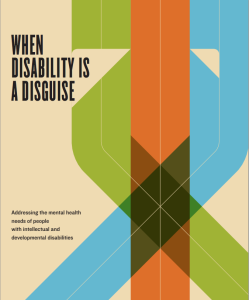When Disability Is a Disguise: Addressing the mental health needs of people with intellectual and developmental disabilities
How Intellectual and Developmental Disabilities Can Obscure Mental Illness
The mental health needs of individuals with intellectual and developmental disabilities (IDD) are often overlooked or ignored. There are many reasons for this, but the primary one is that the disabilities overshadow the possible mental health conditions.
Caregivers and family members who are accustomed to seeing the individual through the lens of the disability can misinterpret behaviors that may be associated with mental illness, distress, or past trauma. It’s a natural reaction, and one that can come from a place of deep love and concern. Unfortunately it means that individuals with IDD often don’t get the state-of-the-art, compassionate, comprehensive mental health treatment they deserve. As a result opportunities for improving behavioral health and recovery can be lost.
The Reality of Trauma
Trauma is not the only cause of mental health challenges in people with IDD, but it’s among the most significant. Adults and children with intellectual disabilities experience abuse, neglect, institutionalization, abandonment, bullying and other types of traumatic abuse and neglect at rates much higher than the general population. A 2013 report by the Spectrum Institute found that 70 percent of respondents with disabilities reported that they had been a victim of abuse and of those 90 percent had experienced such abuse on multiple occasions. Other studies show that children with disabilities are two to ten times more likely to be victims of child abuse compared to children without disabilities.
Where We Are Now
Professionals in the IDD field have historically relied on behavior management strategies to address challenging behaviors with limited consideration of the possible impact of past abuse, neglect, bullying, institutionalization, or a number of other traumatic events often experienced by this population. Likewise, professionals working in the mental health field often lack expertise and experience in working with people with IDD. Both sides of the equation are working against recovery.
Download the full document.

